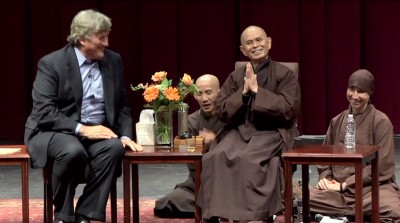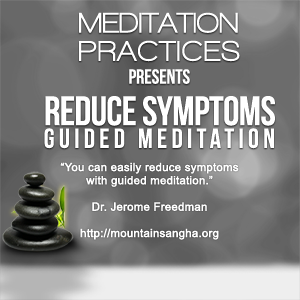 When Zen Master Thich Nhat Hanh was in the Bay Area, he appeared at The Center for Compassion and Altruism Research and Education (CCARE) at Stanford University with Dr. James Doty on October 24, 2013. Dr. Doty engaged in a conversation on compassion with Thich Nhat Hanh, known as Thay by his followers. They talked about Thay’s life experiences and the role compassion played in it.
When Zen Master Thich Nhat Hanh was in the Bay Area, he appeared at The Center for Compassion and Altruism Research and Education (CCARE) at Stanford University with Dr. James Doty on October 24, 2013. Dr. Doty engaged in a conversation on compassion with Thich Nhat Hanh, known as Thay by his followers. They talked about Thay’s life experiences and the role compassion played in it.
Thay talked about a lot of things that have been mentioned before in other articles of Meditation Practices for Healing and Well-being. One of my favorites was Thay’s explanations of the bhrama viharas or the four immeasurable minds of loving kindness, compassion, sympathetic joy, and equanimity. Thay likes to refer to equanimity as inclusiveness.
Acts of compassion are based on your feelings for someone’s suffering, even your own! See, for example, The Mistress of Self-Compassion. When you are kind to another person, it is an act of love, hence, loving kindness.
The other topic that brought much joy to Dr. Doty and the audience is the four mantras. The four mantras teach us how to develop love and understanding. They are
- Darling, I am here for you.
- Darling, I know you are there and I am so happy!
- Darling, I know you are suffering and that is why I am here for you.
- Darling, I suffer. Please help.
Of these four mantras, I think the fourth is the hardest. I often tell my friend when they come to visit, “I glad you are here.” This makes them feel welcome and they reply, “I’m glad to be here!”
Can you please describe your most recent act of kindness you did for yourself or someone else? I’d love to hear what you have to say about this. Please share.












.jpg)
You must be logged in to post a comment.